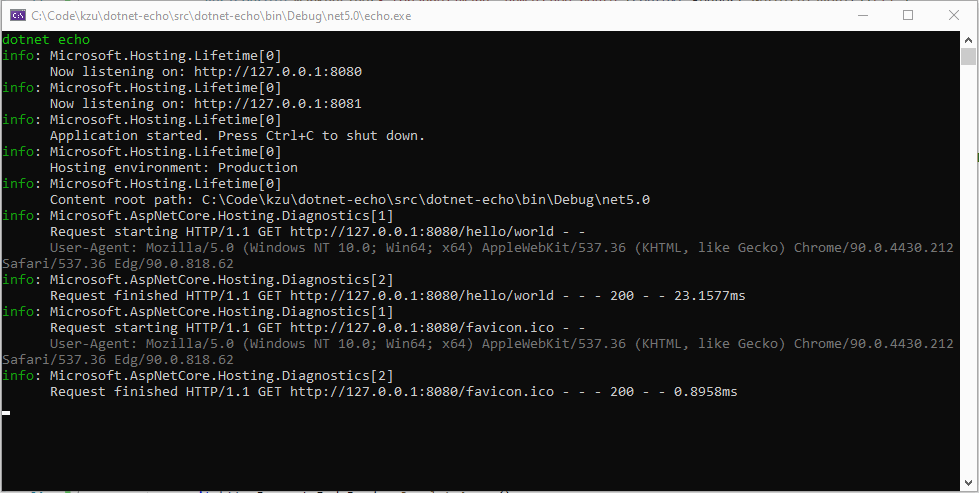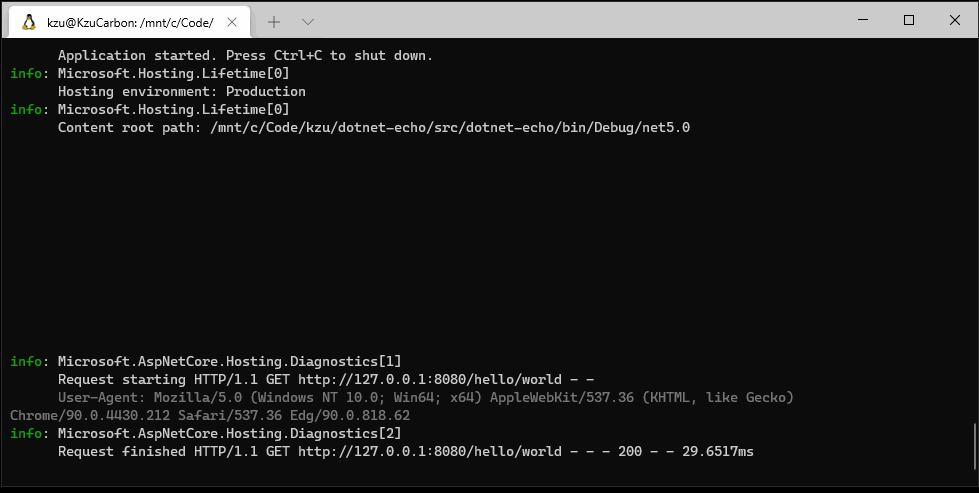https://github.com/kzu/dotnet-echo
A .NET cross-platform micro-service that just echoes whatever you send it
https://github.com/kzu/dotnet-echo
cli csharp dotnet dotnet-tool dotnet-tools
Last synced: 3 months ago
JSON representation
A .NET cross-platform micro-service that just echoes whatever you send it
- Host: GitHub
- URL: https://github.com/kzu/dotnet-echo
- Owner: kzu
- License: mit
- Created: 2021-05-18T23:56:27.000Z (about 4 years ago)
- Default Branch: main
- Last Pushed: 2025-02-09T18:45:28.000Z (5 months ago)
- Last Synced: 2025-04-04T13:49:20.149Z (3 months ago)
- Topics: cli, csharp, dotnet, dotnet-tool, dotnet-tools
- Language: C#
- Homepage: https://www.cazzulino.com/dotnet-echo
- Size: 983 KB
- Stars: 5
- Watchers: 1
- Forks: 0
- Open Issues: 7
-
Metadata Files:
- Readme: readme.md
- Changelog: changelog.md
- License: license.txt
Awesome Lists containing this project
README
 dotnet-echo
============
[](https://www.nuget.org/packages/dotnet-echo) [](https://www.nuget.org/packages/dotnet-echo) [](https://github.com/kzu/dotnet-echo/blob/main/LICENSE) [](https://github.com/kzu/dotnet-file/actions?query=branch%3Amain+workflow%3Abuild+) [](https://pkg.kzu.io/index.json)
Installing or updating (same command can be used for both):
```
dotnet tool update -g dotnet-echo
```
Usage:
```
> dotnet echo -?
echo
A trivial program that echoes whatever is sent to it via HTTP or gRPC
Usage:
echo [options] [...]
Arguments:
Port(s) to listen on. [default: 80 or 443 with --ssl] [default: ]
Options:
-ssl Use HTTPS with self-signed SSL certificate, persisted as dotnet-echo.pfx in the current directory.
-http2 Use HTTP/2 only. Prevents additional port for HTTP/2 to support gRPC.
--version Show version information
-?, -h, --help Show help and usage information
```
The program will automatically check for updates once a day and recommend updating
if there is a new version available.
The service supports gRPC too, with [echo.proto](src/dotnet-echo/echo.proto):
```protobuf
syntax = "proto3";
service chamber {
rpc echo (message) returns (message);
}
message message {
string payload = 1;
}
```
Since gRPC [needs to use HTTP/2](https://docs.microsoft.com/en-US/aspnet/core/grpc/troubleshoot?view=aspnetcore-5.0#unable-to-start-aspnet-core-grpc-app-on-macos),
`dotnet-echo` will use the specified `port`(s) + 1 to listen HTTP/2-only traffic
(i.e. if you specify `8080`, the gRPC endpoint will be available at `http://localhost:8081`).
You can avoid the additional port by forcing HTTP/2-only with the `--http2` option.
Example of a .NET client to run `echo` in the `chamber` service:
```xml
...
```
```csharp
var channel = GrpcChannel.ForAddress("http://localhost:8081");
var service = new chamber.chamberClient(channel);
var response = await service.echoAsync(new message { Payload = "Hello World" }, cancellationToken: cancellation);
Console.WriteLine(response.Payload);
```
Example of a .NET client using HTTP/2 only mode for a regular HTTP POST:
```csharp
var http = new HttpClient();
var send = await http.SendAsync(new HttpRequestMessage(
HttpMethod.Post,
"http://localhost:8081")
{
Content = new StringContent("Hello HTTP"),
Version = new Version(2, 0),
VersionPolicy = HttpVersionPolicy.RequestVersionOrHigher,
});
```
Alternatively, you can force all HTTP requests to be sent with the
required Version 2.0 property with a simple delegating HTTP handler like :
```csharp
class Http2Handler : DelegatingHandler
{
public Http2Handler() : this(new HttpClientHandler()) { }
public Http2Handler(HttpMessageHandler inner) : base(inner) { }
protected override Task SendAsync(HttpRequestMessage request, CancellationToken cancellationToken)
{
request.Version = new Version(2, 0);
request.VersionPolicy = HttpVersionPolicy.RequestVersionOrHigher;
return base.SendAsync(request, cancellationToken);
}
}
```
Which can be consumed like:
```csharp
var http = new HttpClient(new Http2Handler());
var post = await http.PostAsync("http://localhost:8081", new StringContent("Hello HTTP"));
```
Since the handler automatically sets the relevant message properties, we can use the simpler
`Delete/Get/Post/Put` methods instead.
An example of the output during execution:

And running on Ubuntu:
